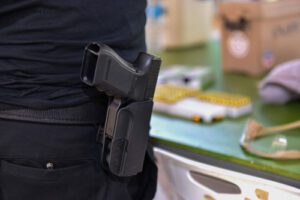 Judge Bumb continued: Next, Defendants contend that where the government is a proprietor of a library or museum, it has a right to exclude firearms. However, the provision does not limit libraries and museums to government-owned ones, and Defendants do not cite to any historical statutes that expressly or analogously prohibited firearms in museums and libraries, despite the fact that at least with respect to libraries, they have been in existence since the days of Benjamin Franklin. [See Pls.’ Br. at 21 (“Benjamin Franklin founded America’s first lending library in Philadelphia in 1731”) (citing “At the Instance of Benjamin Franklin”: A Brief History of the Library Company of Philadelphia (2015)).] Plaintiffs further point to evidence that by 1850, the United States Census reported 1,217 public libraries in the country.
Judge Bumb continued: Next, Defendants contend that where the government is a proprietor of a library or museum, it has a right to exclude firearms. However, the provision does not limit libraries and museums to government-owned ones, and Defendants do not cite to any historical statutes that expressly or analogously prohibited firearms in museums and libraries, despite the fact that at least with respect to libraries, they have been in existence since the days of Benjamin Franklin. [See Pls.’ Br. at 21 (“Benjamin Franklin founded America’s first lending library in Philadelphia in 1731”) (citing “At the Instance of Benjamin Franklin”: A Brief History of the Library Company of Philadelphia (2015)).] Plaintiffs further point to evidence that by 1850, the United States Census reported 1,217 public libraries in the country.
Moreover, the two historical analogues provided by the State to justify its firearm prohibition in publicly owned museums and libraries are inapposite. First, Defendants rely upon a 1773 Maryland law that prohibited bringing any weapon into the Maryland House of Assembly. 63 Proceedings and Acts of the General Assembly 338 § 5 (June 15–July 3, 1773). [Docket No. 20, Ex. 4.] But the provision here does not deal with legislative houses of assembly, places where the Supreme Court specifically acknowledged there is no dispute. See Bruen, 142 S. Ct. at 2134 (listing legislative assemblies as an example of a “sensitive place” where firearms have been historically and constitutionally restricted).
The other is an 1870 Texas law prohibiting guns in “places where persons are assembled for educational, literary or scientific purposes.” 1870 Tex. Gen. Laws 63. [Docket No. 20, Ex. 5.] Plaintiffs are correct that the Bruen Court found two cases from around this time adopting “reasonable grounds” restrictions on firearms in Texas that were “outliers,” and in any event, the Court should not stake its “interpretation of the Second Amendment upon a single law, in effect in a single [State].” Bruen, 142 S. Ct. at 2120, 2153. Thus, there does not appear to be historical support for this restriction, at least at this juncture. Accordingly, Plaintiffs have met their burden of showing that they are likely to succeed on their constitutional challenge as to this provision.
This portion of the opinion is important because it clarifies that, for now, firearms can be carried into museums and libraries in New Jersey. It also shows that the defendants were deceptive in their submissions to the Court in attempting to justify their overly-broad categorization of “sensitive places.”
